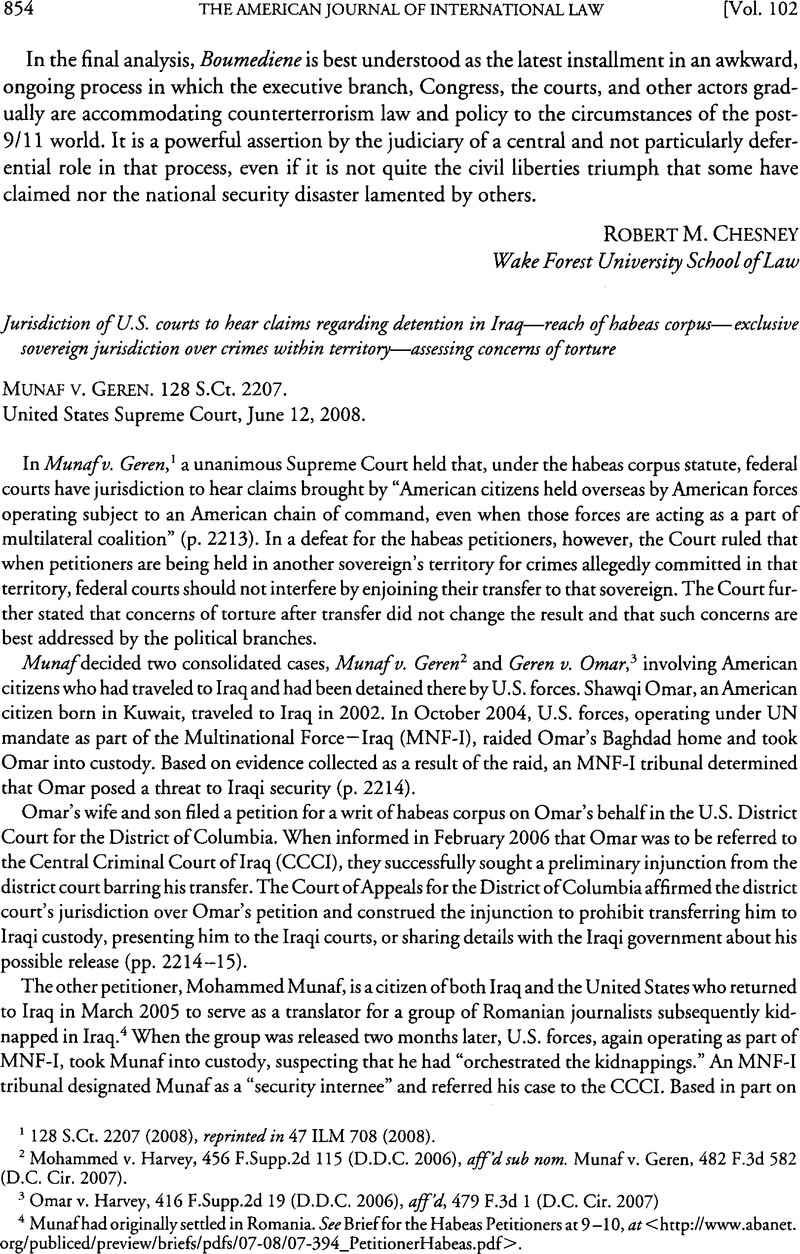Article contents
Munaf v. Geren. 128 S.Ct. 2007
Published online by Cambridge University Press: 27 February 2017
Abstract

- Type
- International Decisions
- Information
- Copyright
- Copyright © American Society of International Law 2008
References
1 128 S.Ct. 2207 (2008), reprinted in 47 ILM 708 (2008).
2 Mohammed v. Harvey, 456 F.Supp.2d 115 (D.D.C. 2006), aff’d sub nom. Munaf v. Geren, 482 F.3d 582 (D.C. Cir. 2007).
3 Omar v. Harvey, 416 F.Supp.2d 19 (D.D.C. 2006), aff’d, 479 F.3d 1 (D.C. Cir. 2007)
4 Munaf had originally settled in Romania. See Brief for the Habeas Petitioners at 9 -10, at <http://www.abanet.org/publiced/preview/briefs/pdfs/07–08/07–394_PetitionerHabeas.pdf>.
5 Quoting In re Hikmat, No. 19/Pub. Comm’n/2007, at 5 (Ct. Cass. Feb. 19, 2008).
6 338 U.S. 197 (1948).
7 Id. at 198.
8 Omar, 479 F.3d at 7–8 (quoting Hirota, 338 U.S. at 198).
9 Munaf v. Geren, 482 F.3d 582, 582–83 (D.C. Cir. 2007).
10 For more on the Hirota decision, see Stephen, I. Vladeck Deconstructing Hirota: Habeas Corpus, Citizenship, and Article III , 95 Geo. L.J. 1497, 1499–1502, 1505–18 (2007).Google Scholar
11 Before moving on to the merits, the Court held that the district court in Omar had abused its discretion in granting a preliminary injunction without considering the likelihood of Omar’s success on the merits. As a result, had the Court not gone on to reach the merits, the rulings in both cases would have been vacated and remanded (p. 2219).
12 The FARR Act, Pub. L. No. 105–277,112 Stat. 2681 (1998), implements provisions of the UN Convention Against Torture into U.S. law.
13 Still open following the decision is whether Hirota would preclude jurisdiction after a conviction by a “foreign tribunal.” The Court sidestepped the issue after Munaf’s conviction was thrown out, but Omar and Munaf may, in time, be convicted.
14 Boumediene v. Bush, 128 S.Ct. 2229 (2008). A case report by Robert Chesney appears in this issue of the Journal.
15 This test may reflect concerns that the UN mandates and multinational coalitions under which U.S. forces increasingly operate—in Iraq, the Balkans, or Afghanistan—could become legal fictions insulating all detentions abroad from judicial review. Similar issues were raised regarding the United Kingdom’s involvement in MNF-I in R (Al-Jedda) v. Secretary of State for Defence, [2007] UKHL 58 (reported by Alexander Orakhelashvili at 102 AJIL 337 (2008)).
16 Boumediene, 128 S.Ct. at 2252.
17 Id. at 2261–62.
18 350 F.Supp.2d 28 (D.D.C. 2004). The case was dismissed after he was transferred to the United States for trial. Abu All v. Gonzales, 387 F.Supp.2d 16, 20 (D.D.C. 2005); see also Vladeck, supra note 10, at 1532–34.
19 Of course, the actual custody in Munaf was much more obvious, with Americans subject to the chain of command as immediate custodian. Moreover, claims like Abu Ali’s may be seriously diminished by Munaf ‘s decision on the merits. See infra notes 21–23 and accompanying text.
20 This deference is a stark contrast with the position of European Court of Human Rights, which recently reaffirmed its own obligation to review diplomatic assurances regarding torture. See Saadi v. Italy, App. No. 37201/06, para. 148 (Eur. Ct. H.R. Feb. 28, 2008) (reported by Fiona de Londras at 102 AJIL 616 (2008)).
21 See, e.g., Brief of Non-governmental Organizations as Amici Curiae Supporting Petitioners at 6, at <http://www.abanet.org/publiced/preview/briefs/pdfs/07–08/07–394_OmarMunafAmCuNonGovtlOrgs.pdf>.
22 350 F.Supp.2d 28; see supra notes 18–19 and accompanying text.
23 See, e.g., Belbacha v. Bush, 520 F.3d 452 (D.C. Cir. 2008).
- 1
- Cited by




